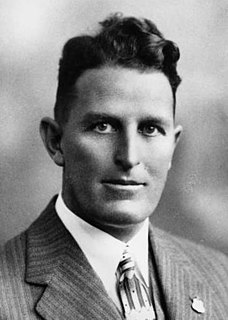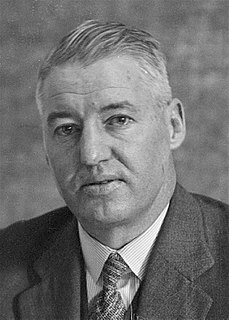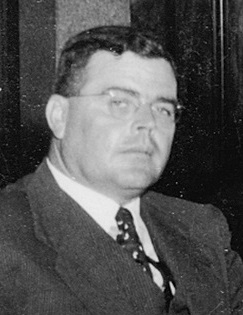| |||||||||||||||||||||||||||||||||||||||||
All 78 seats in the Legislative Assembly of Queensland 40 Assembly seats were needed for a majority | |||||||||||||||||||||||||||||||||||||||||
|---|---|---|---|---|---|---|---|---|---|---|---|---|---|---|---|---|---|---|---|---|---|---|---|---|---|---|---|---|---|---|---|---|---|---|---|---|---|---|---|---|---|
| |||||||||||||||||||||||||||||||||||||||||
| |||||||||||||||||||||||||||||||||||||||||
Elections were held in the Australian state of Queensland on 28 May 1960 to elect the 78 members of the state's Legislative Assembly. The election followed the enactment of the Electoral Districts Act 1958 which increased the Assembly from 75 to 78 seats and modified the zonal system first established by Labor ahead of the 1950 election.

Australia, officially the Commonwealth of Australia, is a sovereign country comprising the mainland of the Australian continent, the island of Tasmania and numerous smaller islands. It is the largest country in Oceania and the world's sixth-largest country by total area. The neighbouring countries are Papua New Guinea, Indonesia and East Timor to the north; the Solomon Islands and Vanuatu to the north-east; and New Zealand to the south-east. The population of 25 million is highly urbanised and heavily concentrated on the eastern seaboard. Australia's capital is Canberra, and its largest city is Sydney. The country's other major metropolitan areas are Melbourne, Brisbane, Perth and Adelaide.

The states and territories are the first-level administrative divisions of the Commonwealth of Australia. They are the second level of government in Australia, located between the federal and local government tiers.

Queensland is the second-largest and third-most populous state in the Commonwealth of Australia. Situated in the north-east of the country, it is bordered by the Northern Territory, South Australia and New South Wales to the west, south-west and south respectively. To the east, Queensland is bordered by the Coral Sea and Pacific Ocean. To its north is the Torres Strait, with Papua New Guinea located less than 200 km across it from the mainland. The state is the world's sixth-largest sub-national entity, with an area of 1,852,642 square kilometres (715,309 sq mi).
Contents
The major parties contesting the election were the Country Party led by Premier Frank Nicklin, the Liberal Party led by Kenneth Morris, the Labor Party led by Jack Duggan and the Queensland Labor Party led by Vince Gair. The Country and Liberal parties had formed a coalition.
The National Party, known as the Country Party until 1974, was a political party in Queensland, Australia, for much of the period from 1915 until 2008. Formed by the Queensland Farmers' Union and serving as the state branch of the National Party of Australia, it initially sought to represent the interests of the farmers but over time became a more general conservative political party in the state, leading to much debate about relations with other conservative parties and a string of mergers that were soon undone. From 1957 it held power as part of a coalition with the state Liberal Party until 1983 when the Liberals broke away and the Nationals continued to govern in their own right until defeat in 1989. The party formed another coalition with the Liberals that took power in 1996 but was defeated in 1998. After a further decade in opposition the two parties merged to form the Liberal National Party of Queensland.

The Premier of Queensland is the head of government in the Australian state of Queensland.

Sir George Francis Reuben Nicklin, was an Australian politician. He was the Premier of Queensland from 1957 to 1968, the first non Labor Party premier since 1932.
The Country-Liberal coalition won a second term in office at the election, although the Labor Party recovered 5 seats and 11% of its vote from the 1957 election. Still, it was the first time since 1912 that a non-Labor government had been re-elected in Queensland.











